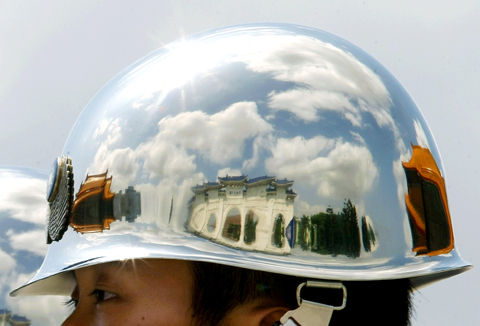President Ma Ying-jeou (馬英九) said yesterday Taiwan would continue to strengthen diplomatic relations with Kiribati but would not oppose the Pacific nation seeking to develop unofficial ties with China.
“We [Taiwan and China] have developed tacit agreement that we will not steal each other's diplomatic allies,” Ma told visiting Kiribatian President Anote Tong at the Presidential Office.
Ma said cross-strait relations have become much warmer since he took office in 2008, which has not only benefited people on both sides of the Taiwan Strait and helped ease regional tensions, but also allowed Taiwan to expand a pragmatic approach to diplomacy.

PHOTO: CNA
He told Tong, whose ancestors came from today’s Guangdong Province, that Taiwan has not interfered in Chinese fishing companies’ bid to form fisheries' cooperation with their Kiribati counterparts.
As a diplomatic ally, Taiwan is now building an international airport for Kiribati to give the island nation faster access to the rest of the world, Ma said.
Taiwan has also launched a program to allow Kiribati students to learn English and Chinese in Taiwanese colleges, he said.
Earlier in the day, Ma attended a red carpet ceremony at the Chiang Kai-shek Memorial Hall Liberty Square, where Tong was welcomed with a military salute.
Tong said Taiwan is an important member of the global community and Kiribati would spare no efforts to help Taiwan join major international organizations.
Tong assumed office in early 2003 and a few months later, the nation established formal diplomatic relations with Taiwan.

MISINFORMATION: The generated content tends to adopt China’s official stance, such as ‘Taiwan is currently governed by the Chinese central government,’ the NSB said Five China-developed artificial intelligence (AI) language models exhibit cybersecurity risks and content biases, an inspection conducted by the National Security Bureau (NSB) showed. The five AI tools are: DeepSeek, Doubao (豆包), Yiyan (文心一言), Tongyi (通義千問) and Yuanbao (騰訊元寶), the bureau said, advising people to remain vigilant to protect personal data privacy and corporate business secrets. The NSB said it, in accordance with the National Intelligence Services Act (國家情報工作法), has reviewed international cybersecurity reports and intelligence, and coordinated with the Ministry of Justice Investigation Bureau and the National Police Agency’s Criminal Investigation Bureau to conduct an inspection of China-made AI language

LIMITS: While China increases military pressure on Taiwan and expands its use of cognitive warfare, it is unwilling to target tech supply chains, the report said US and Taiwan military officials have warned that the Chinese People’s Liberation Army (PLA) could implement a blockade within “a matter of hours” and need only “minimal conversion time” prior to an attack on Taiwan, a report released on Tuesday by the US Senate’s China Economic and Security Review Commission said. “While there is no indication that China is planning an imminent attack, the United States and its allies and partners can no longer assume that a Taiwan contingency is a distant possibility for which they would have ample time to prepare,” it said. The commission made the comments in its annual

CHECKING BOUNDARIES: China wants to disrupt solidarity among democracies and test their red lines, but it is instead pushing nations to become more united, an expert said The US Department of State on Friday expressed deep concern over a Chinese public security agency’s investigation into Legislator Puma Shen (沈伯洋) for “secession.” “China’s actions threaten free speech and erode norms that have underpinned the cross-strait ‘status quo’ for decades,” a US Department of State spokesperson said. The Chongqing Municipal Public Security Bureau late last month listed Shen as “wanted” and launched an investigation into alleged “secession-related” criminal activities, including his founding of the Kuma Academy, a civil defense organization that prepares people for an invasion by China. The spokesperson said that the US was “deeply concerned” about the bureau investigating Shen

‘TROUBLEMAKER’: Most countries believe that it is China — rather than Taiwan — that is undermining regional peace and stability with its coercive tactics, the president said China should restrain itself and refrain from being a troublemaker that sabotages peace and stability in the Indo-Pacific region, President William Lai (賴清德) said yesterday. Lai made the remarks after China Coast Guard vessels sailed into disputed waters off the Senkaku Islands — known as the Diaoyutai Islands (釣魚台) in Taiwan — following a remark Japanese Prime Minister Sanae Takaichi made regarding Taiwan. Takaichi during a parliamentary session on Nov. 7 said that a “Taiwan contingency” involving a Chinese naval blockade could qualify as a “survival-threatening situation” for Japan, and trigger Tokyo’s deployment of its military for defense. Asked about the escalating tensions